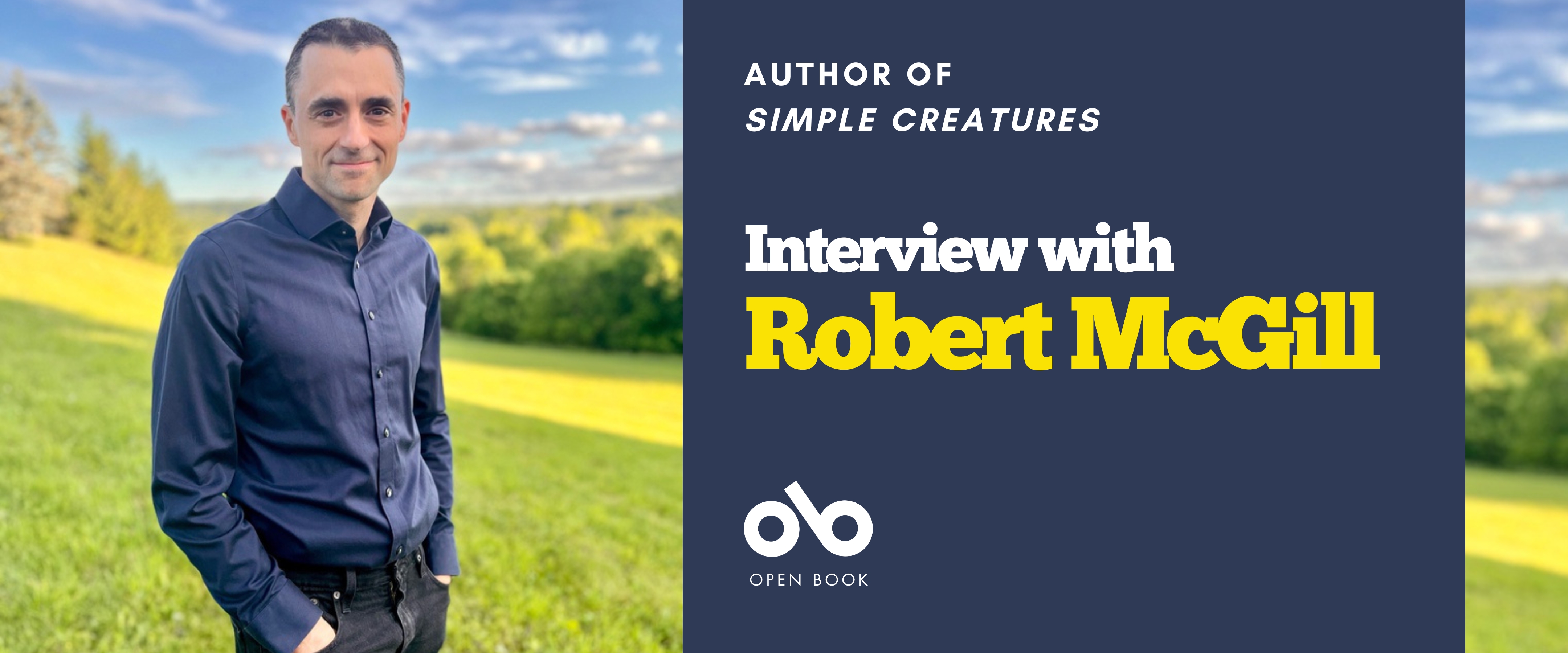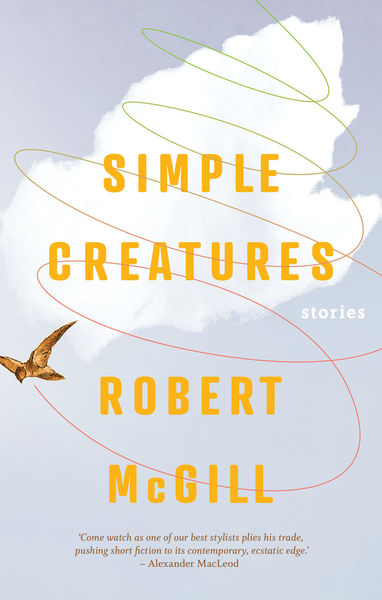Celebrated Novelist Robert McGill Turns to Short Fiction to Examine Our Complicated World
Long celebrated as a novelist and non-fiction author, Robert McGill has turned his keen literary eye to complex personal stories that explore loss, displacement, identity and events that affect characters in an intimate and unique way, but that also speak to broader societal issues that concern us all.
In his latest work, Simple Creatures (Coach House Books), McGill switches gears to short fiction, issuing forth a collection that investigates how people live in the 21st century, and what has been lost along the way to get here. Always a savvy study on the heartaches and joys that his characters experience, he frames these stories in strange mediums like YouTube monologues, school reports, and even the suppressed thoughts of a scholar who is obsessed with a famous writer.
This ambitious collection surprises as it unnerves, gradually unveiling poignant messages about what it means to be human in our time. Whether we're following a teenager who seeks out a Bigfoot community that he believes he's uncovered in the woods, or a hockey player troubled by having the same surname as all-time GOAT Wayne Gretzky, these tales show a level of sympathy and care only found in the finest fiction.
We've got a fascinating Keep it Short interview to share with McGill today on Open Book, so read on to find out more about the author and his latest work.
Open Book:
What do the stories have in common? Do you see a link between them, either structurally or thematically?
Robert McGill:
The stories all involve characters who are, in one way or another, hoping for life to be less complicated. Often, they’re pursuing some form of minimalism: not flying, going phone-free, giving up their possessions. One of them takes a vow of silence—conveniently, right before a public-speaking gig.
The characters’ reasons for doing these things run the gamut, from better mental health to saving the planet. I’m interested in what’s going on for people who take radical steps to live with less. I wanted to explore what they’re feeling and thinking, and what the consequences are for their relationships with others.
OB:
How did you decide on the title?
Your CanLit News
Subscribe to Open Book’s newsletter to get local book events, literary content, writing tips, and more in your inbox
RM:
At first, I thought about titling the book after one of the stories in it. I’m especially partial to first story’s title, “Nobody Goes to Vancouver to Die.” It’s a kind of rejoinder to a line in Margaret Atwood’s novel Cat’s Eye about Vancouver being a popular destination for people in dire straits.
But I wanted a title that would reflect the stories’ variety, because I’d ended up with a range of characters and voices. So, for instance, the main characters in “Nobody Goes to Vancouver to Die” are baby boomers, while the main character in “Your ASMR Boyfriend Addresses the Climate Crisis” is a teenage YouTuber.
The title I landed on, Simple Creatures, isn’t the title of any story in the book. I liked how it fits as a description of many characters in the stories and also of the stories themselves. I think of both people and short fiction as products of the drive to narrativize and invent, often in ways that are painfully, comically straightforward, as well as in ways that can be incredibly complex.
OB:
What do you enjoy most about writing short fiction? What is the toughest part?
RM:
Writing a short story is liberating. You can try out ideas that you’d never take on in a novel. Want to write from the perspective of a fish? Do it in a novel, and you’re signing up for a few years underwater. Short stories aren’t beholden to all the demands of novelistic structure, so they can be much nimbler and more surprising.
For me, maybe the hardest part of writing a story is getting the amount of information in it right. I might create a novel’s worth of backstory for a character but eventually realize that the story works best when it’s only a few pages.
That isn’t to say you can’t have maximalist short fiction—stories stuffed with facts and details and divagations. As a writer, you have to honour the maxim “Never more than what’s necessary,” but each story makes its own rules about what counts as “necessary.”
OB:
Did you do any specific research for any of your stories? Tell us a bit about that process.
RM:
The type of research varied by story. “Your Puppy Meets the World” came of reading Sophia Yin’s book Perfect Puppy in 7 Days. For “The Stars Are Falling,” I made some calls to find out about playing cards in Croatia. For “Your ASMR Boyfriend Addresses the Climate Crisis,” I read more about ASMR boyfriends than was strictly required—and watched a lot of YouTube videos.
For other stories, the research was personal experience. “Report on the Bigfoot Collective” came out of a year I spent in Upstate New York. “The Isle of Thanet” came out of a single hour I spent on the English coast near Canterbury.
I do make things up, though. Unlike the main character in “The Stress of Lives,” for instance, I have never been reincarnated as a chimp. At least, not as far as I know.
OB:
What was the strangest or most memorable moment or experience during the writing process for you?
RM:
Probably, it was while writing “The Thunberg Pledge,” which is about an environmentalist pledge that goes viral. The story starts with the pledge itself, which has seven points. I spent a lot of time working them out, and once I’d got them set, I found myself mulling at length the possibility of putting the pledge into the world for real on social media. That mulling made its way into the story, too.
OB:
Who did you dedicate your collection to, and why?
RM:
The writer Siobhan Phillips, because she has been a close friend and a first reader of my stories for twenty-five years now, and because she gives the best kind of feedback you could want: candid, insightful, alive to a wide range of possibilities in terms of what fiction can do.
There are twelve stories in Simple Creatures, a few of them published in magazines when I was just starting out, and Siobhan’s the only person who has given me feedback on first drafts of all of them. I couldn’t not dedicate the book to her.
________________________________________________
Robert McGill's writing has appeared in magazines including The Atlantic, The Dublin Review, Hazlitt, and The Walrus. He teaches at the University of Toronto. His previous books include two novels, The Mysteries and Once We Had a Country, and two nonfiction books, The Treacherous Imagination and War Is Here. Visit him at robert-mcgill.com.







